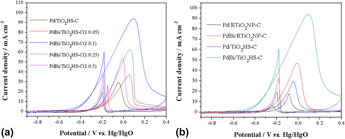Published online by Cambridge University Press: 22 November 2016

The TiO2 hollow spheres (TiO2HS) were successfully prepared by a hydrothermal method and added to Vulcan XC-72 carbon black as the support materials for Pd nanoparticles. A facile approach to promote ethylene glycol (EG) electrooxidation in alkaline medium was carried out by the PdBi/TiO2HS-C catalyst. The results show that Pd and Bi nanoparticles are uniformly dispersed on the surface of carbon-doped TiO2 hollow spheres, the appropriate amount of Bi modification into Pd/TiO2HS-C catalyst can enhance remarkably the electrocatalytic activity for EG oxidation, in which the PdBi/TiO2HS-C (Pd:Bi = 1:0.1) catalyst exhibits excellent stability. The high electrochemical performance is attributed to the unique structure and high surface area of the TiO2HS, metal nanoparticles uniform distribution, the electronic effect between Pd and Bi as well as the bifunctional effect between metal nanoparticles and the support TiO2HS-C. The results obtained are significant for the development of new Pd-based TiO2HS-C electrocatalysts for alcohol fuel cells.
To send this article to your Kindle, first ensure no-reply@cambridge.org is added to your Approved Personal Document E-mail List under your Personal Document Settings on the Manage Your Content and Devices page of your Amazon account. Then enter the ‘name’ part of your Kindle email address below. Find out more about sending to your Kindle. Find out more about saving to your Kindle.
Note you can select to save to either the @free.kindle.com or @kindle.com variations. ‘@free.kindle.com’ emails are free but can only be saved to your device when it is connected to wi-fi. ‘@kindle.com’ emails can be delivered even when you are not connected to wi-fi, but note that service fees apply.
Find out more about the Kindle Personal Document Service.
To save this article to your Dropbox account, please select one or more formats and confirm that you agree to abide by our usage policies. If this is the first time you used this feature, you will be asked to authorise Cambridge Core to connect with your Dropbox account. Find out more about saving content to Dropbox.
To save this article to your Google Drive account, please select one or more formats and confirm that you agree to abide by our usage policies. If this is the first time you used this feature, you will be asked to authorise Cambridge Core to connect with your Google Drive account. Find out more about saving content to Google Drive.